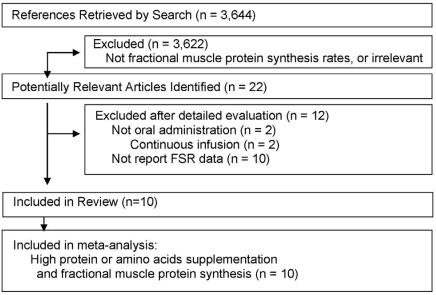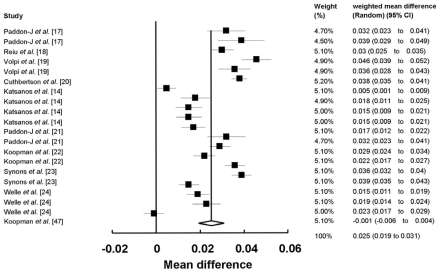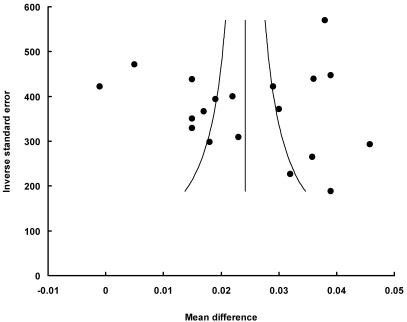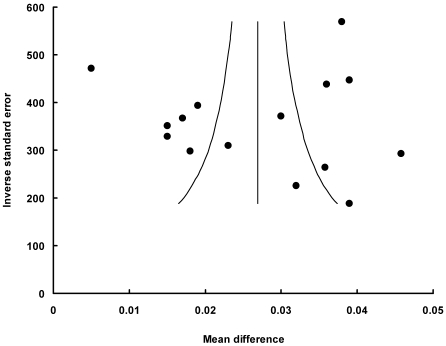Nutr Res Pract.
2010 Oct;4(5):375-382.
Short-term protein intake increases fractional synthesis rate of muscle protein in the elderly: meta-analysis
- Affiliations
-
- 1Department of Social Welfare, Kyungnam University, Masan 631-701, Korea.
- 2Department of Social Welfare, Kyungbook National University, Daegu 702-701, Korea.
- 3R&D Center, Sempio Foods Company, 231 Maegok-ri, Hobup-myeon, Icheon 467-821, Korea. ldaehee@sempio.com
Abstract
- The precise effects of protein intake on fractional synthesis rate (FSR) of muscle protein are still under debate. The sample size of these studies was small and the conclusions in young and elderly subjects were inconsistent. To assess the effect of dietary protein intake on the FSR level, we conducted a meta-analysis of controlled protein intake trials. Random-effects models were used to calculate the weighted mean differences (WMDs). Ten studies were included and effects of short-term protein intake were evaluated. In an overall pooled estimate, protein intake significantly increased the FSR (20 trials, 368 participants; WMD: 0.025%/h; 95%CI: 0.019-0.031; P < 0.0001). Meta-regression analysis suggested that the protein dose was positively related to the effect size (regression coefficient = 0.108%/h; 95%CI: 0.035, 0.182; P = 0.009). A subgroup analysis indicated that protein intake significantly increased FSR when the protein dose was < or = 0.80 g/kg BW (16 trials, 308 participants; WMD: 0.027%/h; 95%CI: 0.019-0.031; P < 0.0001), but did not affect FSR when the protein dose was > 0.80 g/kg BW (4 trials, 60 participants; WMD: 0.016%/h; 95%CI: 0.004-0.029; P = 0.98). In conclusion, this study is the first integrated results showing that a short-term protein intake is effective at improving the FSR of muscle protein in the healthy elderly as well as young subjects. This beneficial effect seems to be dose-dependent when the dose levels of protein range from 0.08 to 0.80 g/kg BW.
MeSH Terms
Figure
Reference
-
1. Dutta C, Hadley EC. The significance of sarcopenia in old age. J Gerontol A Biol Sci Med Sci. 1995; 50:1–4. PMID: 7493199.
Article2. Evans W. Functional and metabolic consequences of sarcopenia. J Nutr. 1997; 127:998S–1003S. PMID: 9164283.3. Roberts SB. Effects of aging on energy requirements and the control of food intake in men. J Gerontol A Biol Sci Med Sci. 1995; 50:101–106. PMID: 7493200.4. Wolfe RR. The underappreciated role of muscle in health and disease. Am J Clin Nutr. 2006; 84:475–482. PMID: 16960159.
Article5. Balagopal P, Rooyackers OE, Adey DB, Ades PA, Nair KS. Effects of aging on in vivo synthesis of skeletal muscle myosin heavychain and sarcoplasmic protein in humans. Am J Physiol. 1997; 273:E790–E800. PMID: 9357810.6. Welle S, Thornton C, Jozefowicz R, Statt M. Myofibrillar protein synthesis in young and old men. Am J Physiol. 1993; 264:E693–E698. PMID: 8498491.
Article7. Yarasheski KE, Pak-Loduca J, Hasten DL, Obert KA, Brown MB, Sinacore DR. Resistance exercise training increases mixed muscle protein synthesis rate in frail women and men ≥76 yr old. Am J Physiol. 1999; 277:E118–E125. PMID: 10409135.
Article8. Marzetti E, Lees HA, Wohlgemuth SE, Leeuwenburgh C. Sacopenia of aging: Underlying cellular mechanisms and protection by calorie restriction. Biofactors. 2009; 35:28–35. PMID: 19319843.9. Paddon-Jones D, Short KR, Campbell WW, Volpi E, Wolfe RR. Role of dietary protein in the sacopenia of aging. Am J Clin Nutr. 2008; 87:1562S–1566S. PMID: 18469288.10. Baumgartner RN, Koehler KM, Gallagher D. Epidemiology of sarcopenia among the elderly in New Mexico. Am J Epidemiol. 1998; 147:755–763. PMID: 9554417.
Article11. Aniansson A, Sperling L, Rundgren A, Lehnberg E. Muscle function in 75-year-old men and women. A longitudinal study. Scand J Rehabil Med Suppl. 1983; 9:92–102. PMID: 6585946.12. Janssen I, Shepard DS, Katzmarzyk PT, Roubenoff R. The healthcare costs of sarcopenia in the United States. J Am Geriatr Soc. 2004; 52:80–85. PMID: 14687319.13. Rennie MJ, Edwards RH, Halliday D, Matthews DE, Wolman SL, Millward DJ. Muscle protein synthesis measured by stable isotope techniques in man: the effects of feeding and fasting. Clin Sci (Lond). 1982; 63:519–523. PMID: 6181926.
Article14. Katsanos CR, Kobayashi H, Sheffield-Moore M, Aarsland A, Wolfe RR. A high proportion of leucine is required for optimal stimulation of the rate of muscle protein synthesis by essential amino acids in the elderly. Am J Physiol Endocrinol Metab. 2006; 291:E381–E387. PMID: 16507602.
Article15. Borsheim E, Bui QUT, Tissier S, Kobayashi H, Ferrando AA, Wolfe RR. Effect of amino acid supplementation on muscle mass, strength and physical function in elderly. Clin Nutr. 2008; 27:189–195. PMID: 18294740.16. Short KR, Vittone JL, Bigelow ML, Proctor DN, Nair KS. Age and aerobic exercise training effects on whole body and muscle protein metabolism. Am J Physiol Endocrinol Metab. 2004; 286:E92–E101. PMID: 14506079.
Article17. Paddon-Jones D, Sheffield-Moore M, Zhang XJ, Volpi E, Wolf SE, Aarsland A, Ferrando AA, Wolfe RR. Amino acid ingestion improves muscle protein synthesis in the young and elderly. Am J Physiol Endocrinol Metab. 2004; 286:E321–E328. PMID: 14583440.
Article18. Rieu I, Balage M, Sornet C, Giraudet C, Pujos E, Grizard J, Mosoni L, Dardevet D. Leucine supplementation improves muscle protein synthesis in elderly men independently of hyperaminoacidaemia. J Physiol. 2006; 575:305–315. PMID: 16777941.
Article19. Volpi E, Mittendorfer B, Wolf SE, Wolfe RR. Oral amino acids stimulate muscle protein anabolism in the elderly despite higher first-pass splanchnic extraction. Am J Physiol. 1999; 277:E513–E520. PMID: 10484364.20. Cuthbertson D, Smith K, Babraj J, Leese G, Waddell T, Atherton P, Wackerhage H, Taylor PM, Rennie MJ. Anabolic signaling deficits underlie amino acid resistance of wasting, aging muscle. FASEB J. 2005; 19:422–424. PMID: 15596483.
Article21. Paddon-Jones D, Sheffield-Moore M, Katsanos CS, Zhang XJ, Wolfe RR. Differential stimulation of muscle protein synthesis in elderly humans following isocaloric ingestion of amino acids or whey protein. Exp Gerontol. 2006; 41:215–219. PMID: 16310330.
Article22. Koopman R, Verdijk L, Manders RJF, Gijsen AP, Gorselink M, Pijpers E, Wagenmakers AJM, van Loon LJC. Co-ingestion of protein and leucine stimulates muscle protein synthesis rates to the same extent in young and elderly lean men. Am J Clin Nutr. 2006; 84:623–632. PMID: 16960178.
Article23. Symons TB, Schutzler SE, Cocke TL, Chinkes DL, Wolfe RR, Paddon-Jones D. Aging does not impair the anabolic response to a protein-rich meal. Am J Clin Nutr. 2007; 86:451–456. PMID: 17684218.
Article24. Welle S, Thornton CA. High-protein meals do not enhance myofibrillar synthesis after resistance exercise in 62- to 75-yr-old men and women. Am J Physiol. 1998; 274:E677–E683. PMID: 9575829.25. Moore DR, Robinson MJ, Fry JL, Tang JE, Glover EI, Wilkinson SB, Prior T, Tarnopolsky MA, Phillips SM. Ingested protein dose response of muscle and albumin protein synthesis after resistance exercise in young men. Am J Clin Nutr. 2009; 89:161–168. PMID: 19056590.
Article26. Caso G, Feiner J, Mileva I, Bryan LJ, Kelly P, Autio K, Gelato MC, McNurlan MA. Response of albumin synthesis to oral nutrients in young and elderly subject. Am J Clin Nutr. 2007; 85:446–451. PMID: 17284742.27. Bos C, Benamouzig R, Bruhat A, Roux C, Mahé S, Valensi P, Gaudichon C, Ferrière F, Rautureau J, Tomé D. Short-term protein and energy supplementation activates nitrogen kinetics and accretion in poorly nourished elderly subjects. Am J Clin Nutr. 2000; 71:1129–1137. PMID: 10799375.
Article28. Engelen MPKJ, Rutten EPA, De Castro CLN, Wouters EFM, Schols AMWJ, Deutz NEP. Supplementation of soy protein with branched-chain amino acids alters protein metabolism in healthy elderly and even more in patients with chronic obstructive pulmonary disease. Am J Clin Nutr. 2007; 85:431–439. PMID: 17284740.
Article29. Katsanos CS, Chinkes DL, Paddon-Jones D, Xiao-jun Zhang X, Aarsland A, Robert R, Wolfe RR. Whey protein ingestion in elderly persons results in greater muscle protein accrual than ingestion of its constituent essential amino acid content. Nutr Res. 2008; 28:651–658. PMID: 19083472.
Article30. Wilkinson SB, Tarnopolsky MA, MacDonald MJ, MacDonald JR, Armstrong D, Phillips SM. Consumption of fluid skim milk promotes greater muscle protein accretion after resistance exercise than does consumption of an isonitrogenous and isoenergetic soy-protein beverage. Am J Clin Nutr. 2007; 85:1031–1040. PMID: 17413102.
Article31. Katsanos CS, Kobayashi H, Sheffield-Moore M, Aarsland A, Wolfe RR. Aging is associated with diminished accretion of muscle proteins after the ingestion of a small bolus of essential amino acids. Am J Clin Nutr. 2005; 82:1065–1073. PMID: 16280440.
Article32. Volpi E, Sheffield-Moore M, Rasmussen BB, Wolfe RR. Basal muscle amino acid kinetics and protein synthesis in healthy young and older men. JAMA. 2001; 286:1206–1212. PMID: 11559266.
Article33. Wolfe RR, Chinkes DL. Isotope Tracers in Metabolic Research: Principles and Practice of Kinetic Analysis. 2005. New Jersey: John Wiley & Sons Inc.;p. 9–76.34. DerSimonian R, Laird N. Meta-analysis in clinical trials. Control Clin Trials. 1986; 7:177–188. PMID: 3802833.
Article35. Higgins JP, Thompson SG, Deeks JJ, Altman DG. Measuring inconsistency in meta-analyses. BMJ. 2003; 327:557–560. PMID: 12958120.
Article36. Egger M, Davey Smith G, Schneider M, Minder C. Bias in meta-analysis detected by a simple, graphical test. BMJ. 1997; 315:629–634. PMID: 9310563.
Article37. Rosenthal R. The "file drawer problem" and tolerance for null results. Psychol Bull. 1979; 86:638–641.
Article38. Donatelli F, Schricker T, Parrella P, Asenjo F, Wykes L, Carli F. Intraoperative infusion of amino acids induces anabolism independent of the type of anesthesia. Anesth Analg. 2006; 103:1549–1556. PMID: 17122238.
Article39. Tipton KD, Ferrando AA, Phillips SM, Doyle D Jr, Wolfe RR. Postexercise net protein synthesis in human muscle from orally administered amino acids. Am J Physiol. 1999; 276:E628–E634. PMID: 10198297.40. Verhoeven S, Vanschoonbeek K, Verdijk LB, Koopman R, Wodzig WKWH, Dendale P, van Loon LJC. Long-term leucine supplementation does not increase muscle mass or strength in healthy elderly men. Am J Clin Nutr. 2009; 89:1468–1475. PMID: 19321567.
Article41. Drummond MJ, Dreyer HC, Pennings B, Fry CS, Dhanani S, Dillon EL, Sheffield-Moore M, Volpi E, Rasmussen BB. Skeletal muscle protein anabolic response to resistance exercise and essential amino acids is delayed with aging. J Appl Physiol. 2008; 104:1452–1461. PMID: 18323467.
Article42. Wolfe RR. Protein supplements and exercise. Am J Clin Nutr. 2000; 72:551S–557S. PMID: 10919959.
Article43. Walrand S, Short KR, Bigelow ML, Sweatt AJ, Hutson SM, Nair KS. Functional impact of high protein intake on healthy elderly people. Am J Physiol Endocrinol Metab. 2008; 295:E921–E928. PMID: 18697911.
Article44. Houston DK, Nicklas BJ, Ding J, Harris TB, Tylavsky FA, Newman AB, Lee JS, Sahyoun NR, Visser M, Kritchevsky SB. Health ABC Study. Dietary protein intake is associated with lean mass change in older, community-dwelling adults: the Health, Aging, and Body Composition (Health ABC) Study. Am J Clin Nutr. 2008; 87:150–155. PMID: 18175749.
Article45. Roth E. Skeletal muscle gain: how much can be achieved by protein and amino acid administration? Curr Opin Clin Nutr Metab Care. 2008; 11:32–33. PMID: 18090655.
Article46. Lord C, Chaput JP, Aubertin-Leheudre M, Labonté M, Dionne IJ. Dietary animal protein intake: association with muscle mass index in older women. J Nutr Health Aging. 2007; 11:383–387. PMID: 17657359.47. Koopman R, Verdijk LB, Beelen M, Gorselink M, Kruseman AN, Wagenmakers AJM, Kuipers H, van Loon LJC. Co-ingestion of leucine with protein does not further augment post-exercise muscle protein synthesis rates in elderly men. Br J Nutr. 2008; 99:571–580. PMID: 17697406.
Article48. Rand WM, Pellett PL, Young VR. Meta-analysis of nitrogen balance studies for estimating protein requirements in healthy adults. Am J Clin Nutr. 2003; 77:109–127. PMID: 12499330.
Article49. Kumar V, Selby A, Rankin D, Patel R, Atherton P, Hildebrandt W, Williams J, Smith K, Seynnes O, Hiscock N, Rennie M. Age-related differences in the dose-response relationship of muscle protein synthesis to resistance exercise in young and old men. J Physiol. 2009; 587:211–217. PMID: 19001042.
Article50. Wang X, Proud CG. The mTOR pathway in the control of protein synthesis. Physiology (Bethesda). 2006; 21:362–369. PMID: 16990457.
Article51. Rasmussen BB, Wolfe RR, Volpi E. Oral and intravenously administered amino acids produce similar effects on muscle protein synthesis in the elderly. J Nutr Health Aging. 2002; 6:358–362. PMID: 12459885.52. Campbell WW, Johnson CA, McCabe GP, Carnell NS. Dietary protein requirements of younger and older adults. Am J Clin Nutr. 2008; 88:1322–1329. PMID: 18996869.53. O'Mahony D, O'Leary P, Quigley EM. Aging and intestinal motility: a review of factors that affect intestinal motility in the aged. Drugs Aging. 2002; 19:515–527. PMID: 12182688.
- Full Text Links
- Actions
-
Cited
- CITED
-
- Close
- Share
- Similar articles
-
- Association of Low Hand Grip Strength with Protein Intake in Korean Female Elderly: based on the Seventh Korea National Health and Nutrition Examination Survey (KNHANES VII), 2016-2018
- Adequacy of Protein Intake among Korean Elderly: An Analysis of the 2013–2014 Korea National Health and Nutrition Examination Survey Data
- Comparison of Muscle Mass Indexes According to Protein Intake in Obese Patients
- Relationship between Low Muscle Strength, and Protein Intake: A Preliminary Study of Elderly Patients with Hip Fracture
- A Comparison of Nutritional Status and Muscle Strength of Elderly Women in a Social Welfare Center and Those Residing at Home





